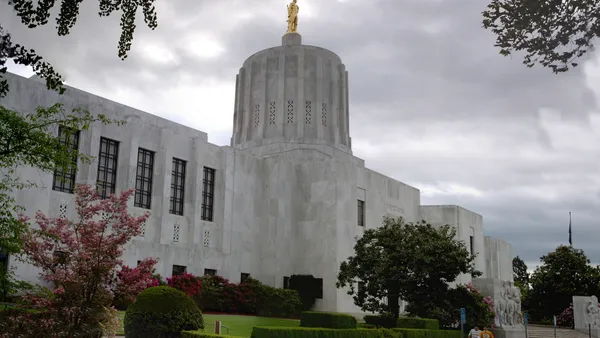UPDATE: Jan. 16, 2020: The Colorado Banking Board on Thursday voted 7-1 against a measure that would have advanced a bid by Elevations Credit Union to purchase the assets of Cache Bank & Trust.
The Colorado Bankers Association wrote a letter to the board Monday opposing the deal because credit unions can’t be "authorized purchasers" of banks, according to language in several Colorado statutes.
Lawmakers should clarify or change existing laws rather than let regulators rule on how such acquisitions should proceed, Don Childears, CEO of the Colorado Bankers Association, wrote Monday.
"You are being asked to approve a sale to an ineligible buyer," Childears wrote. "We oppose allowing an ineligible purchaser — a nonbank, a credit union or otherwise — under state law to acquire a bank."
That argument appeared to resonate with banking board members Thursday.
“Banks can buy banks, and credit unions can buy credit unions,” board member Ron Tilton said. “When we start mixing those things up, I start to get stuck. … I’m not sure I have the power to interpret [the banking code] any differently.”
“We don’t have clarity,” board member Tim Daly added. “My inclination is to defer to the Legislature whenever possible.”
A lawyer representing Cache disagreed. “We know there are instances where banks will sell assets — loans for example — to non-banks,” so Colorado code shouldn’t be interpreted as prohibiting the sale of a bank to a credit union, attorney Ernie Panasci told the Daily Camera of Boulder.
Asked whether he intends to appeal the decision, Elevations CEO Gerry Agnes declined to comment to that publication.
The Elevations-Cache deal was expected to close by the end of March. The combined entity would have $2.2 billion in assets and 141,700 members.
Dive Brief:
- The Colorado Bankers Association asked the state banking board in a letter this week to stop Elevations Credit Union’s plan to buy the assets of Cache Bank & Trust because credit unions can’t be "authorized purchasers" of banks, according to language in several Colorado statutes.
- The board was set to consider Cache Bank & Trust’s authorization request Thursday.
- Credit unions announced 16 bank acquisitions in 2019, nearly doubling the nine deals announced in 2018, according to American Banker. Banks and industry trade groups have slammed the practice, saying tax exemptions give credit unions an unfair advantage.
Dive Insight:
Credit unions’ tax-exempt status is at the crux of several organizations’ disagreements with proposed purchases of banks. The Independent Community Bankers of America launched a campaign in October aimed at ending the “risky practices, costly tax subsidies, and irresponsibly lax oversight” of “growth-obsessed” credit unions.
Childears raised the tax responsibility issue in his letter Monday.
"We have no quarrel with Cache Bank & Trust, but we object on principle to any unauthorized purchaser, in essence any nonbank, in such a transaction," he wrote to the banking board. "This includes a tax-advantaged credit union, buying a tax-paying bank. We believe in a free market, but one in which all competing businesses play by the same rules. That isn’t the case here."
Elevations agreed in September to buy Cache’s assets, a deal Childears this week called "an effort to expand the credit union’s activities beyond what was contemplated in law and by a process to avoid the clear limitations and intent of Colorado statutes."
Federal regulators have defended bank acquisitions by credit unions, citing that that dynamic covers relatively few deals. During a December hearing in front of the House Financial Services Committee, National Credit Union Administration Chairman Rodney Hood implied that the "roughly 250 bank-on-bank acquisitions just over the past year alone" dwarfs credit unions' purchases of banks.
"I would like to note for the record that these are voluntary market-based transactions," he said, adding that the mergers are subject to approval by his agency and the Federal Deposit Insurance Corp. "They require dual approval. They are not happening arbitrarily or capriciously."
Hood also noted that, in some cases, communities would be without banking access if a credit union hadn't decided to purchase a community bank.














